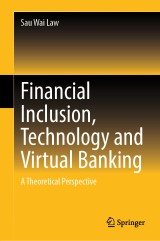Details
Financial Inclusion, Technology and Virtual Banking
A Theoretical Perspective|
CHF 165.50 |
|
| Verlag: | Springer |
| Format: | |
| Veröffentl.: | 13.05.2024 |
| ISBN/EAN: | 9789819711277 |
| Sprache: | englisch |
| Anzahl Seiten: | 200 |
Dieses eBook enthält ein Wasserzeichen.
Beschreibungen
<p>This book challenges the notion that technology promotes financial inclusion. Drawing insights from the retail banking industry in Hong Kong, it explores the potential drawbacks of technology adoption. The book combines existing articles, regulatory case studies, and interviews with customers and practitioners to propose four factors that measure digital financial inclusion, defined as the impact of technology on financial inclusion, from the customer's viewpoint. It offers practical guidance by identifying business incentives for banks and providing law and policy recommendations for regulators. This book serves as a valuable resource for scholars, regulators, and practitioners in law and social sciences, shedding light on the complex relationship between technology and financial inclusion while bridging the gap between supply-driven approaches and customer demands.</p><br><p></p>
<div>Chapter 1 – Use of technology to develop a more financially inclusive world.- Part I: Promoting financial inclusion and technology adoption – A case study of the launch of virtual bank in Hong Kong.- Chapter 2 - Could increasing regulatory focus realise the inclusive potential of virtual banks.- Chapter 3 – Financial inclusion and virtual bank in the era of digitalisation: A regulatory case study in Hong Kong.- Chapter 4 – Promoting financial inclusion through the launch of virtual banks? Empirical insights from Hong Kong banking customers.- Part II - Theorizing financial inclusion and technology adoption in banking.- Chapter 5 – Sense of security.- Chapter 6 – Role of regulator.- Chapter 7 – Social acceptance of technology.- Chapter 8 – History of operation.- Chapter 9 – The way forward – Measuring financial inclusion from the client’s perspective.<br></div>
<p>Sau Wai LAW (Samuel) is a Lecturer (Assistant Professor) in Corporate and Commercial Law at the School of Law at University of Reading, UK. Before becoming an a full-time academic in January 2021, he had more than 14 years of banking experience in Hong Kong, taking up roles in credit risk management, private banking, and strategic planning. He is a trainer, course reviewer, study guide writer, and subject reviewer at Hong Kong Institute of Bankers on the Certified Banker Program and Enhanced Competency Framework in Operational Risk Management and Compliance. He is the author of “Banking and Finance Dispute Resolution in Hong Kong: The Suitability of Arbitration in Private Disputes”. He holds a Ph.D. from the Faculty of Law at University of Hong Kong, B.A. (Hons) in Economics, M.Sc. in Economics for Development, LLB and LLM (Arbitration and Dispute Resolution). His research interests are Dispute Resolution, Banking and Finance Law, Professional Ethics, Risk & Compliance, Financial Inclusion, and Virtual Banking. <br></p><br>
<p>This book challenges the notion that technology promotes financial inclusion. Drawing insights from the retail banking industry in Hong Kong, it explores the potential drawbacks of technology adoption. The book combines existing articles, regulatory case studies, and interviews with customers and practitioners to propose four factors that measure digital financial inclusion, defined as the impact of technology on financial inclusion, from the customer's viewpoint. It offers practical guidance by identifying business incentives for banks and providing law and policy recommendations for regulators. This book serves as a valuable resource for scholars, regulators, and practitioners in law and social sciences, shedding light on the complex relationship between technology and financial inclusion while bridging the gap between supply-driven approaches and customer demands.</p>
Challenges existing views on technology's role in financial inclusion Proposes a customer-centric model for digital financial inclusiveness Provides guidance for regulators and banks in navigating complex relationship between technology and financial inclusion
Diese Produkte könnten Sie auch interessieren:

Universities of the future in a time of excellence and internationalism

von: Dr. Ali Al-Salami

CHF 7.50
















